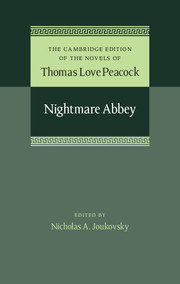Book contents
- Frontmatter
- Contents
- List of Illustrations
- General Editor’s Preface
- Acknowledgements
- Chronology
- List of Abbreviations
- Introduction
- Nightmare Abbey
- Appendix A Peacock’s Preface of 1837
- Appendix B An Essay on Fashionable Literature (1818)
- Appendix C The Four Ages of Poetry (1820)
- Note on the Text
- Emendations and Variants
- Ambiguous Line-End Hyphenations
- Explanatory Notes
- Select Bibliography
General Editor’s Preface
Published online by Cambridge University Press: 30 June 2022
- Frontmatter
- Contents
- List of Illustrations
- General Editor’s Preface
- Acknowledgements
- Chronology
- List of Abbreviations
- Introduction
- Nightmare Abbey
- Appendix A Peacock’s Preface of 1837
- Appendix B An Essay on Fashionable Literature (1818)
- Appendix C The Four Ages of Poetry (1820)
- Note on the Text
- Emendations and Variants
- Ambiguous Line-End Hyphenations
- Explanatory Notes
- Select Bibliography
Summary
‘That Peacock is a classic’, declared the scholar and editor R. W. Chapman in 1924, ‘now needs no proof; he has passed his century, and his reputation grows.’ Such a judgement might have appeared sanguine even in the year in which The Works of Thomas Love Peacock, edited by H. F. B. Brett-Smith and C. E. Jones (1924–34), also known as the Halliford Edition, began to be published. During the early 1920s, Oxford University Press steadfastly resisted proposals for works by and about Peacock. But Chapman – learned, urbane Secretary to Delegates of the Press from 1920 to 1942 – was eager to see the novels back in print. He remarked in his Introduction to the World's Classics edition of The Misfortunes of Elphin and Crotchet Castle that the ‘experiment’ of publishing them, shortly after the initial five volumes of his ground-breaking edition of Jane Austen (1923) had appeared, might transform Peacock into a ‘popular classic’.
The present editors hope, in part, to realize that frustrated ambition. It seems fitting that the Cambridge Edition of the Novels of Thomas Love Peacock should appear not long after the Cambridge Edition of the Works of Jane Austen (2005–8). That the decades since the 1920s have been kinder to Austen than to Peacock is no surprise; unlike Austen, Peacock is habitually, wilfully arcane. Nora Crook and Derek Guiton observe that ‘His writings contain references as inaccessible to the common reader as medieval graffiti in cathedral towers’; the historical and architectural contexts are appropriate, as is the flavour of irreverence suggested by ‘graffiti’. Even if his comic fictions abound, like Austen’s, with clever, goodlooking women and with sparkling dialogue that culminates in marriage, Peacock's repartee can be hard to follow. On a first, unmediated encounter with him, many readers will feel, with Captain Fitzchrome (in Chapter 6 of Crotchet Castle), that ‘the pleasantry and the obscurity go together’. Peacock does not aspire to the portrayal of interiority – perhaps the most cherished aspect of Austen's novels. Rather, his characters, both male and female, exist primarily in order to share, voice and test the limits of their ideas. His fictions, rebuffing intimacy, are inescapably political and intellectual. To approach the nineteenth-century novel via Peacock is therefore to see it as an outward-facing genre indebted to philosophical tracts, lectures, classical dialogues and the rhythms of parliamentary debate.
- Type
- Chapter
- Information
- Nightmare Abbey , pp. xi - xxPublisher: Cambridge University PressPrint publication year: 2016



